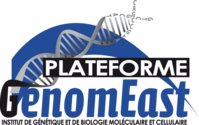Dihydrofolate reductase activity controls neurogenic transitions in the developing neocortex
Abstract
One-carbon/folate (1C) metabolism supplies methyl groups required for DNA and histone methylation, and is involved in the maintenance of self-renewal in stem cells. Dihydrofolate reductase (DHFR), a key enzyme in 1C metabolism, is highly expressed in human and mouse neural progenitors at the early stages of neocortical development. Here, we have investigated the role of DHFR in the developing neocortex and report that reducing its activity in human neural organoids and mouse embryonic neocortex accelerates indirect neurogenesis, thereby affecting neuronal composition of the neocortex. Furthermore, we show that decreasing DHFR activity in neural progenitors leads to a reduction in one-carbon/folate metabolites and correlates with modifications of H3K4me3 levels. Our findings reveal an unanticipated role for DHFR in controlling specific steps of neocortex development and indicate that variations in 1C metabolic cues impact cell fate transitions.
Origin : Publisher files allowed on an open archive
licence : CC BY - Attribution
licence : CC BY - Attribution


